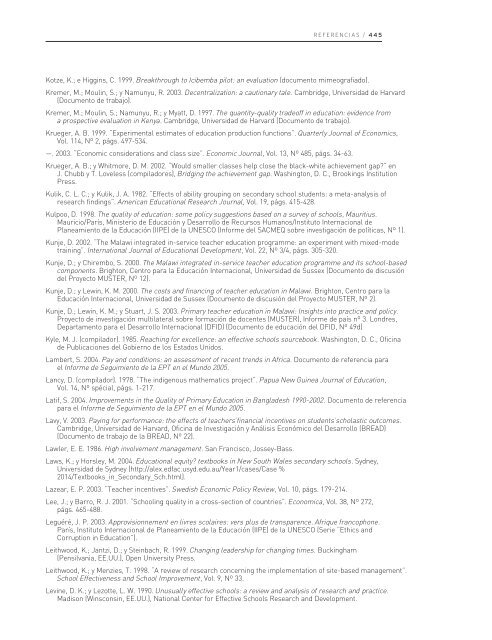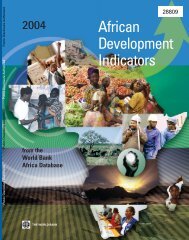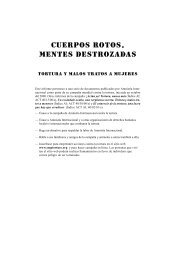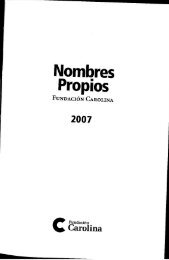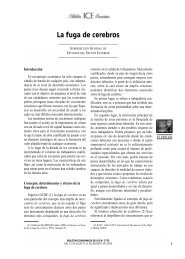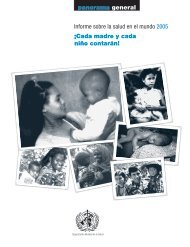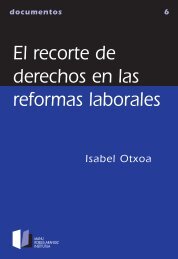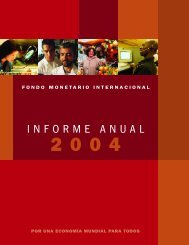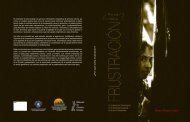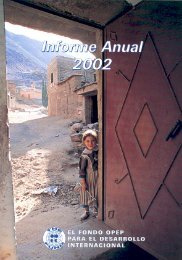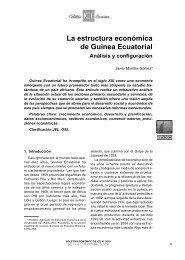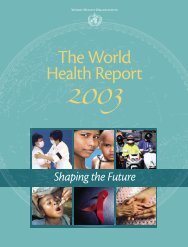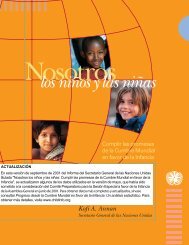Educación para todos: el imperativo de la calidad; Informe ... - eFaber
Educación para todos: el imperativo de la calidad; Informe ... - eFaber
Educación para todos: el imperativo de la calidad; Informe ... - eFaber
- No tags were found...
You also want an ePaper? Increase the reach of your titles
YUMPU automatically turns print PDFs into web optimized ePapers that Google loves.
REFERENCIAS / 445Kotze, K.; e Higgins, C. 1999. Breakthrough to Icibemba pilot: an evaluation (documento mimeografiado).Kremer, M.; Moulin, S.; y Namunyu, R. 2003. Decentralization: a cautionary tale. Cambridge, Universidad <strong>de</strong> Harvard(Documento <strong>de</strong> trabajo).Kremer, M.; Moulin, S.; Namunyu, R.; y Myatt, D. 1997. The quantity-quality tra<strong>de</strong>off in education: evi<strong>de</strong>nce froma prospective evaluation in Kenya. Cambridge, Universidad <strong>de</strong> Harvard (Documento <strong>de</strong> trabajo).Krueger, A. B. 1999. “Experimental estimates of education production functions”. Quarterly Journal of Economics,Vol. 114, Nº 2, págs. 497-534.—. 2003. “Economic consi<strong>de</strong>rations and c<strong>la</strong>ss size”. Economic Journal, Vol. 13, Nº 485, págs. 34-63.Krueger, A. B.; y Whitmore, D. M. 2002. “Would smaller c<strong>la</strong>sses h<strong>el</strong>p close the b<strong>la</strong>ck-white achievement gap?” enJ. Chubb y T. Lov<strong>el</strong>ess (compi<strong>la</strong>dores), Bridging the achievement gap. Washington, D. C., Brookings InstitutionPress.Kulik, C. L. C.; y Kulik, J. A. 1982. “Effects of ability grouping on secondary school stu<strong>de</strong>nts: a meta-analysis ofresearch findings”. American Educational Research Journal, Vol. 19, págs. 415-428.Kulpoo, D. 1998. The quality of education: some policy suggestions based on a survey of schools, Mauritius.Mauricio/París, Ministerio <strong>de</strong> Educación y Desarrollo <strong>de</strong> Recursos Humanos/Instituto Internacional <strong>de</strong>P<strong>la</strong>neamiento <strong>de</strong> <strong>la</strong> Educación (IIPE) <strong>de</strong> <strong>la</strong> UNESCO (<strong>Informe</strong> d<strong>el</strong> SACMEQ sobre investigación <strong>de</strong> políticas, Nº 1).Kunje, D. 2002. “The Ma<strong>la</strong>wi integrated in-service teacher education programme: an experiment with mixed-mo<strong>de</strong>training”. International Journal of Educational Dev<strong>el</strong>opment, Vol. 22, Nº 3/4, págs. 305-320.Kunje, D.; y Chirembo, S. 2000. The Ma<strong>la</strong>wi integrated in-service teacher education programme and its school-basedcomponents. Brighton, Centro <strong>para</strong> <strong>la</strong> Educación Internacional, Universidad <strong>de</strong> Sussex (Documento <strong>de</strong> discusiónd<strong>el</strong> Proyecto MUSTER, Nº 12).Kunje, D.; y Lewin, K. M. 2000. The costs and financing of teacher education in Ma<strong>la</strong>wi. Brighton, Centro <strong>para</strong> <strong>la</strong>Educación Internacional, Universidad <strong>de</strong> Sussex (Documento <strong>de</strong> discusión d<strong>el</strong> Proyecto MUSTER, Nº 2).Kunje, D.; Lewin, K. M.; y Stuart, J. S. 2003. Primary teacher education in Ma<strong>la</strong>wi: Insights into practice and policy.Proyecto <strong>de</strong> investigación multi<strong>la</strong>teral sobre formación <strong>de</strong> docentes (MUSTER), <strong>Informe</strong> <strong>de</strong> país nº 3. Londres,Departamento <strong>para</strong> <strong>el</strong> Desarrollo Internacional (DFID) (Documento <strong>de</strong> educación d<strong>el</strong> DFID, Nº 49d)Kyle, M. J. (compi<strong>la</strong>dor). 1985. Reaching for exc<strong>el</strong>lence: an effective schools sourcebook. Washington, D. C., Oficina<strong>de</strong> Publicaciones d<strong>el</strong> Gobierno <strong>de</strong> los Estados Unidos.Lambert, S. 2004. Pay and conditions: an assessment of recent trends in Africa. Documento <strong>de</strong> referencia <strong>para</strong><strong>el</strong> <strong>Informe</strong> <strong>de</strong> Seguimiento <strong>de</strong> <strong>la</strong> EPT en <strong>el</strong> Mundo 2005.Lancy, D. (compi<strong>la</strong>dor). 1978. “The indigenous mathematics project”. Papua New Guinea Journal of Education,Vol. 14, Nº spécial, págs. 1-217.Latif, S. 2004. Improvements in the Quality of Primary Education in Bang<strong>la</strong><strong>de</strong>sh 1990-2002. Documento <strong>de</strong> referencia<strong>para</strong> <strong>el</strong> <strong>Informe</strong> <strong>de</strong> Seguimiento <strong>de</strong> <strong>la</strong> EPT en <strong>el</strong> Mundo 2005.Lavy, V. 2003. Paying for performance: the effects of teachers’financial incentives on stu<strong>de</strong>nts’scho<strong>la</strong>stic outcomes.Cambridge, Universidad <strong>de</strong> Harvard, Oficina <strong>de</strong> Investigación y Análisis Económico d<strong>el</strong> Desarrollo (BREAD)(Documento <strong>de</strong> trabajo <strong>de</strong> <strong>la</strong> BREAD, Nº 22).Lawler, E. E. 1986. High involvement management. San Francisco, Jossey-Bass.Laws, K.; y Horsley, M. 2004. Educational equity? textbooks in New South Wales secondary schools. Sydney,Universidad <strong>de</strong> Sydney (http://alex.edfac.usyd.edu.au/Year1/cases/Case %2014/Textbooks_in_Secondary_Sch.html).Lazear, E. P. 2003. “Teacher incentives”. Swedish Economic Policy Review, Vol. 10, págs. 179-214.Lee, J.; y Barro, R. J. 2001. “Schooling quality in a cross-section of countries”. Economica, Vol. 38, Nº 272,págs. 465-488.Leguéré, J. P. 2003. Approvisionnement en livres sco<strong>la</strong>ires: vers plus <strong>de</strong> transparence. Afrique francophone.París, Instituto Internacional <strong>de</strong> P<strong>la</strong>neamiento <strong>de</strong> <strong>la</strong> Educación (IIPE) <strong>de</strong> <strong>la</strong> UNESCO (Serie “Ethics andCorruption in Education”).Leithwood, K.; Jantzi, D.; y Steinbach, R. 1999. Changing lea<strong>de</strong>rship for changing times. Buckingham(Pensilvania, EE.UU.), Open University Press.Leithwood, K.; y Menzies, T. 1998. “A review of research concerning the implementation of site-based management”.School Effectiveness and School Improvement, Vol. 9, Nº 33.Levine, D. K.; y Lezotte, L. W. 1990. Unusually effective schools: a review and analysis of research and practice.Madison (Winsconsin, EE.UU.), National Center for Effective Schools Research and Dev<strong>el</strong>opment.


